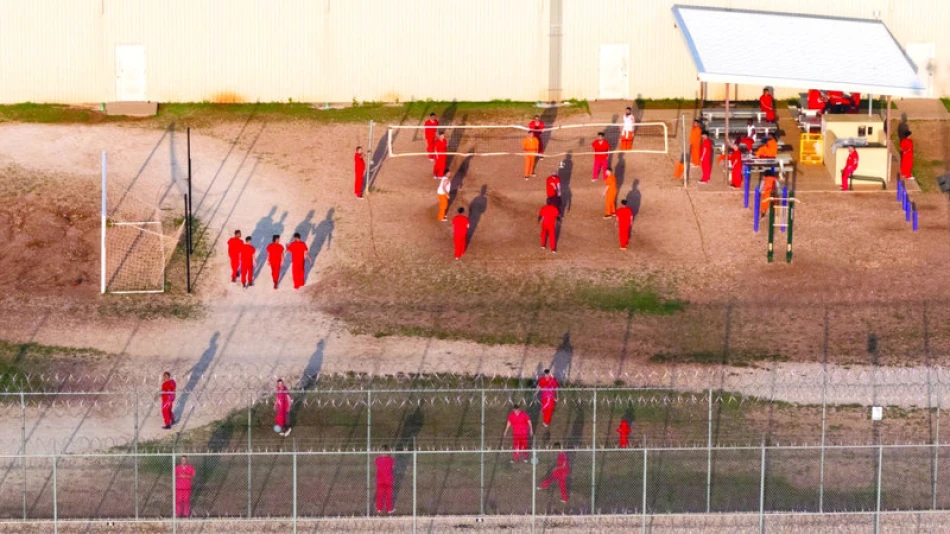
US Expands Aggressive Immigrant Detention Practices During Court Proceedings
Trump's Immigration Crackdown Transforms Courts Into Deportation Traps
Immigration courts across the United States have become hunting grounds for federal agents as the Trump administration escalates its deportation campaign, targeting even legal immigrants who followed proper procedures. The systematic arrests of migrants attending mandatory court hearings represent a dramatic shift from due process to what critics describe as institutional betrayal, with agents now conducting up to 3,000 daily arrests—ten times the rate under Biden's final year.
A Legal Entry Becomes a Deportation Case
Jerome, a Cuban immigrant, traveled 1,000 miles from California to El Paso, Texas, to support his wife Jenny at her immigration hearing. The 25-year-old journalist had entered the U.S. legally through Biden's now-canceled "CBP One" program after fleeing Cuba in December 2024, where she faced government persecution for her radio coverage of domestic conditions.
What should have been a routine proceeding for someone eligible for a green card turned into a nightmare. Despite the judge granting Jenny asylum consideration and scheduling her next hearing for August 2026, masked federal agents surrounded her as she left the courtroom. Her brief smile of relief transformed into a silent plea for help as agents escorted her away.
"I told them she entered the country legally. You don't care, do you? Nobody cares about that. You just like removing people like this," Jerome told the agents, who refused to make eye contact.
Strategic Court Shopping and System Gaming
Jenny's case illustrates the administration's sophisticated approach to immigration enforcement. After her arrest, officials transferred her case from a judge who approves most asylum requests to one with a rejection rate exceeding 78%. Her August 2026 hearing was moved up to next month, where prosecutors will again seek dismissal.
This pattern of "judge shopping" reflects a broader strategy. Migrants arrested in Chicago courts are being transported to Missouri, Florida, and Texas—not just because detention space is available, but because judges in these jurisdictions are more likely to support Trump's rapid deportation policies.
The Expedited Removal Trap
Immigration and Customs Enforcement (ICE) agents now coordinate directly with government attorneys to request case dismissals during hearings. When judges comply, migrants are arrested immediately upon leaving the courtroom, allowing officials to reclassify their cases under "expedited removal"—a process that can deport individuals with minimal legal procedures and sometimes without seeing another judge.
Initially targeting migrants who had been in the U.S. for less than two years, agents are now expanding to include longer-term residents and those with pending legal cases. The strategy exploits a legal loophole while creating maximum psychological impact on immigrant communities.
Detention Conditions Designed to Break Resistance
Arrested migrants are packed into overcrowded, often privately-run detention centers far from their families. These facilities deliberately limit access to legal representation while subjecting detainees to harsh conditions designed to discourage them from continuing their legal fights.
The administration's electronic tracking system for detainees frequently malfunctions, causing some individuals to effectively disappear within the system—a development that terrifies families and makes legal representation nearly impossible.
Community Terror and Court Avoidance
The psychological warfare is working. In Chicago, immigrant communities have gone silent, with many skipping mandatory court appearances rather than risk arrest. This creates a perverse outcome: those who fail to appear are automatically ordered deported, achieving the administration's goals without formal proceedings.
"They don't want to leave their homes because of ongoing arrests, so they don't want to go anywhere where there are federal agents," explained Stefano Spero, assistant director of protection-based relief at the National Center for Immigrant Justice.
Targeting Strategy: Singles Over Families
ICE agents generally avoid arresting families with children, instead focusing on single adults who often serve as primary breadwinners for extended families. This calculated approach maximizes economic disruption while minimizing public relations backlash from images of detained children.
In San Antonio immigration court, judges now actively encourage "self-deportation," with some dismissing cases before prosecutors even request it. Courtrooms display messaging urging migrants to "leave on their own" before being forced out.
Historical Context and Global Implications
This systematic courthouse targeting represents an unprecedented escalation in U.S. immigration enforcement. Unlike previous administrations that focused on criminal deportations or border apprehensions, Trump's approach weaponizes the legal system itself, transforming courts from venues of justice into deportation processing centers.
The strategy mirrors authoritarian tactics used globally, where legal proceedings become traps rather than protections. For international observers, America's treatment of legal migrants who followed proper procedures signals a fundamental shift away from rule-of-law principles.
Economic and Diplomatic Consequences
The courthouse arrests are already generating diplomatic tensions with countries like Cuba, whose nationals entered through official U.S. programs. The policy effectively criminalizes legal immigration pathways, potentially deterring future cooperation on migration management.
For businesses and investors, the unpredictable enforcement creates workforce instability and legal uncertainty. Companies that relied on legal immigrant workers now face potential disruption as employees avoid any government contact, including routine legal proceedings.
The Trump administration's transformation of immigration courts into deportation assembly lines represents more than policy change—it's a fundamental restructuring of American legal principles that prioritizes removal efficiency over due process, with consequences that extend far beyond immigration law.
Most Viewed News

 Sara Khaled
Sara Khaled






